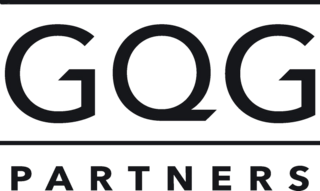An index fund is a mutual fund or exchange-traded fund (ETF) designed to follow certain preset rules so that it can replicate the performance ("track") of a specified basket of underlying investments. While index providers often emphasize that they are for-profit organizations, index providers have the ability to act as "reluctant regulators" when determining which companies are suitable for an index. Those rules may include tracking prominent indices like the S&P 500 or the Dow Jones Industrial Average or implementation rules, such as tax-management, tracking error minimization, large block trading or patient/flexible trading strategies that allow for greater tracking error but lower market impact costs. Index funds may also have rules that screen for social and sustainable criteria.
In the field of finance, private equity (PE) is capital stock in a private company that does not offer stock to the general public. Private equity is offered instead to specialized investment funds and limited partnerships that take an active role in the management and structuring of the companies. In casual usage, "private equity" can refer to these investment firms rather than the companies that they invest in.

Neuberger Berman Group LLC is a private, independent, employee-owned investment management firm. The firm manages equities, fixed income, private equity and hedge fund portfolios for global institutional investors, advisors and high-net-worth individuals.

The Bear Stearns Companies, Inc. was an American investment bank, securities trading, and brokerage firm that failed in 2008 as part of the global financial crisis and recession. After its closure it was subsequently sold to JPMorgan Chase. The company's main business areas before its failure were capital markets, investment banking, wealth management, and global clearing services, and it was heavily involved in the subprime mortgage crisis.

Franklin Resources, Inc. is an American multinational holding company that, together with its subsidiaries, is referred to as Franklin Templeton; it is a global investment firm founded in New York City in 1947 as Franklin Distributors, Inc. It is listed on the New York Stock Exchange under the ticker symbol BEN, in honor of Benjamin Franklin, for whom the company is named, and who was admired by founder Rupert Johnson Sr. In 1973, the company's headquarters moved from New York to San Mateo, California.

New York Life Insurance Company (NYLIC) is the third-largest life insurance company and the largest mutual life insurance company in the United States, and is ranked #71 on the 2023 Fortune 500 list of the largest U.S. corporations by total revenue. In 2023, NYLIC achieved the best possible ratings by the four independent rating companies. Other New York Life affiliates provide an array of securities products and services, as well as institutional and retail mutual funds.
In finance, assets under management (AUM), sometimes called fund under management, measures the total market value of all the financial assets which an individual or financial institution—such as a mutual fund, venture capital firm, or depository institution—or a decentralized network protocol controls, typically on behalf of a client. Funds may be managed for clients, platform users, or solely for themselves, such as in the case of a financial institution which has mutual funds or holds its own venture capital. The definition and formula for calculating AUM may differ from one entity to another.

Bridgewater Associates, LP is an American investment management firm founded by Ray Dalio in 1975. The firm serves institutional clients including pension funds, endowments, foundations, foreign governments, and central banks. As of 2022, Bridgewater has posted the second highest gains of any hedge fund since its inception in 1975. The firm began as an institutional investment advisory service, graduated to institutional investing, and pioneered the risk parity investment approach in 1996.
Thomas Rowe Price Jr. was the founder of T. Rowe Price, an American publicly owned investment firm, established in 1937 and headquartered in Baltimore, Maryland. The company offers mutual funds, subadvisory services, and separate account management for individuals, institutions, retirement plans, and financial intermediaries. Along with Philip Fisher, Price was an early proponent of the growth investing strategy.

Socially responsible investing (SRI) is any investment strategy which seeks to consider both financial return and social/environmental good. The areas of concern recognized by the SRI practitioners are sometimes summarized under the heading of environmental, social and governance (ESG) issues: environment, social, and corporate governance. Impact investing is subset of SRI that is generally more proactive and focused on the conscious creation of social impact through investment. Eco-investing is SRI with a focus on environmentalism.

An alternative investment, also known as an alternative asset or alternative investment fund (AIF), is an investment in any asset class excluding capital stocks, bonds, and cash. The term is a relatively loose one and includes tangible assets such as precious metals, collectibles and some financial assets such as real estate, commodities, private equity, distressed securities, hedge funds, exchange funds, carbon credits, venture capital, film production, financial derivatives, cryptocurrencies, non-fungible tokens, and Tax Receivable Agreements. Investments in real estate, forestry and shipping are also often termed "alternative" despite the ancient use of such real assets to enhance and preserve wealth. Alternative investments are to be contrasted with traditional investments.

William Stromberg is a former president and CEO of T. Rowe Price, a Baltimore-based global asset management firm.

Raymond Thomas Dalio is an American investor and hedge fund manager, who has served as co-chief investment officer of the world's largest hedge fund, Bridgewater Associates, since 1985. He founded Bridgewater in 1975 in New York.
The Canada Pension Plan Investment Board, operating as CPP Investments, is a Canadian Crown corporation established by way of the 1997 Canada Pension Plan Investment Board Act to oversee and invest the funds contributed to and held by the Canada Pension Plan (CPP).

On March 23, 2009, the United States Federal Deposit Insurance Corporation (FDIC), the Federal Reserve, and the United States Treasury Department announced the Public–Private Investment Program for Legacy Assets. The program is designed to provide liquidity for so-called "toxic assets" on the balance sheets of financial institutions. This program is one of the initiatives coming out of the implementation of the Troubled Asset Relief Program (TARP) as implemented by the U.S. Treasury under Secretary Timothy Geithner. The major stock market indexes in the United States rallied on the day of the announcement rising by over six percent with the shares of bank stocks leading the way. As of early June 2009, the program had not been implemented yet and was considered delayed. Yet, the Legacy Securities Program implemented by the Federal Reserve has begun by fall 2009 and the Legacy Loans Program is being tested by the FDIC. The proposed size of the program has been drastically reduced relative to its proposed size when it was rolled out.
Lord, Abbett & Co. LLC is an independent, privately-held investment management company headquartered in Jersey City, New Jersey. The firm offers a variety of fixed−income and equity strategies to individual and institutional investors. Lord Abbett has a global presence with offices in Jersey City, Dubai, Dublin, London, Montevideo, Singapore, Tokyo, and Zurich.
Profit Investment Management, LLC is a SEC registered investment advisory firm based in Bethesda, MD. The Firm was founded in 1996 by Eugene Profit, the current president, CEO, and portfolio manager of the firm. Profit Investment Management manages large-cap, small-cap and ESG equity portfolios.
LaSalle Investment Management ("LaSalle") is a real estate investment management firm. It is an independent subsidiary of JLL.
David R. Giroux is Chief Investment Officer of US equity and multi-asset and portfolio manager of T. Rowe Price Capital Appreciation Fund, and Head of Investment Strategy at T. Rowe Price Capital.

GQG Partners is an investment management company headquartered in Fort Lauderdale, Florida. The company focuses on active management of equity portfolios. It is currently traded on the Australian Securities Exchange and is a constituent member of the S&P/ASX 200 index.













